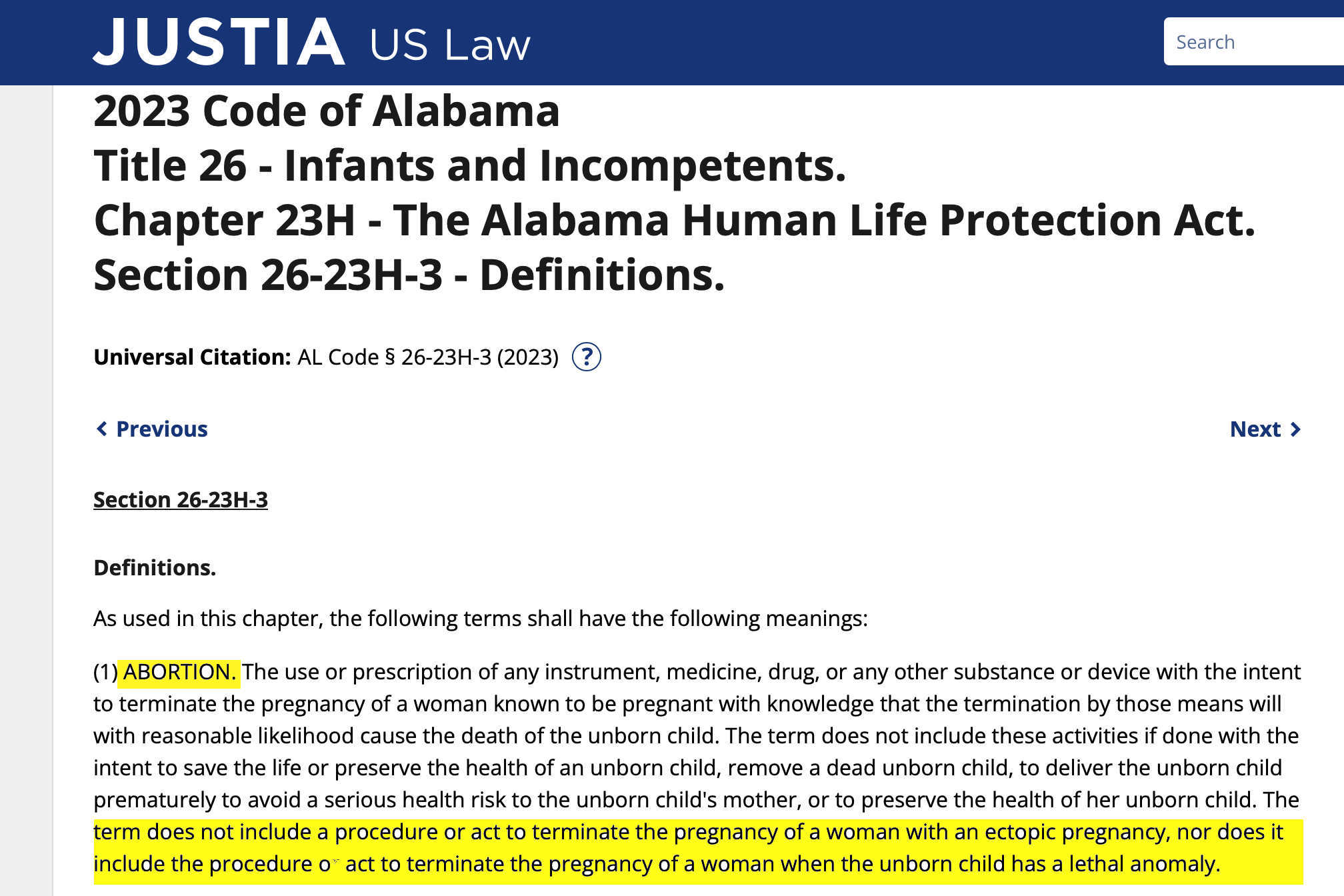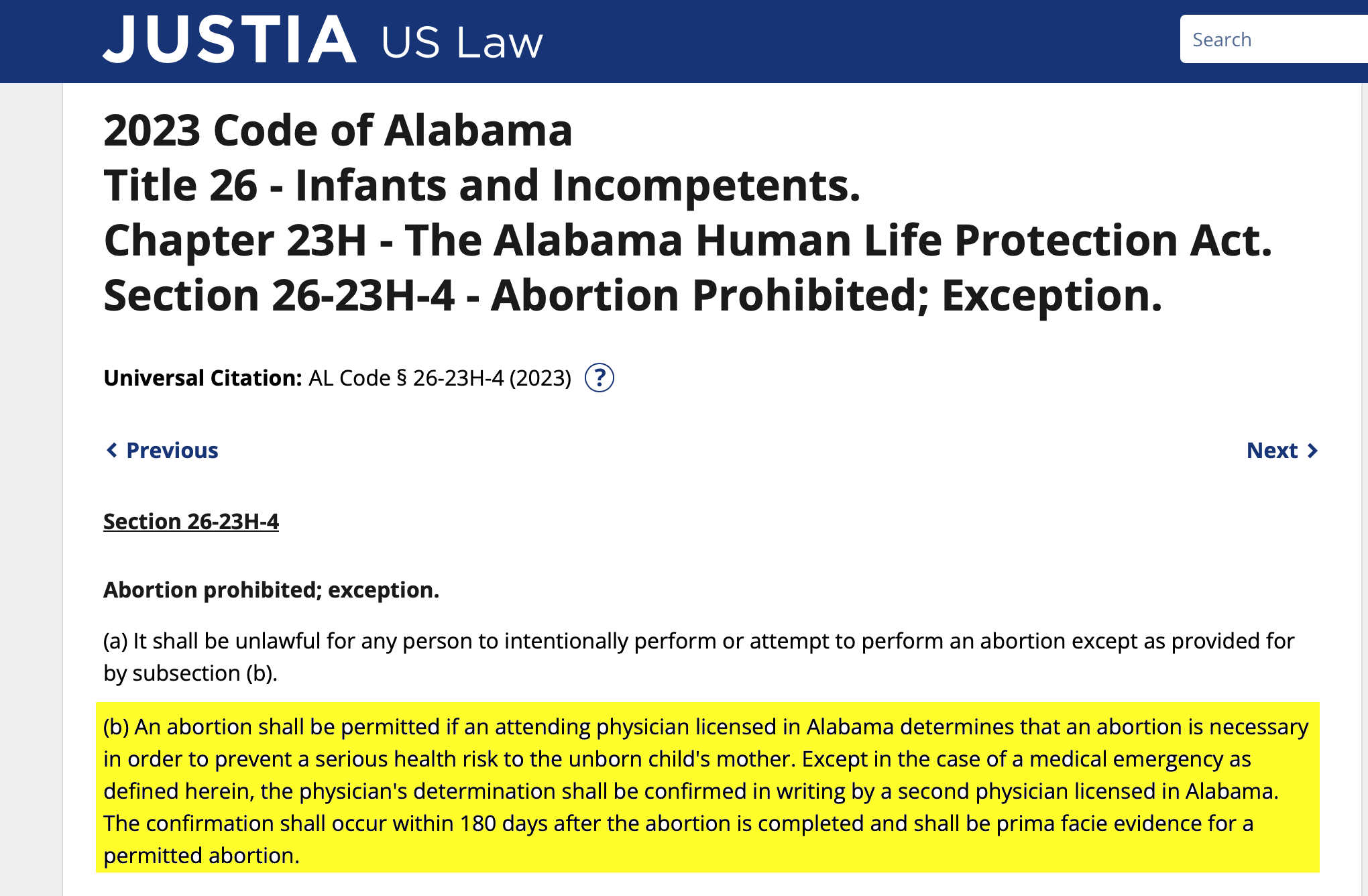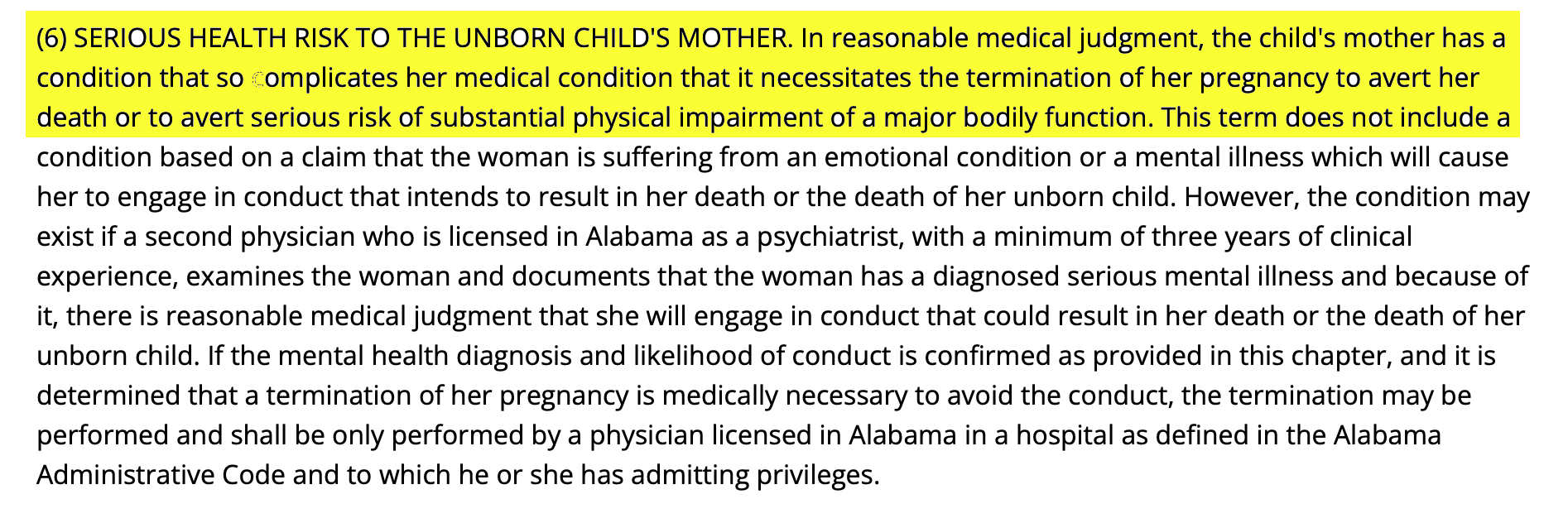Alabama mom Tamara Costa recently told The Meteor that she was denied a necessary, life-saving induced abortion in the state in June of 2024. Yet a closer look proves that nothing in Alabama’s law prevented her from getting an induced abortion.
Despite this, her story is being used to promote a pro-abortion agenda.
One of the most glaring problems with The Meteor’s story is the fact that neither the reporting outlet itself, nor any of the physicians mentioned in the story, correctly noted the clear facts about Alabama’s abortion law — which allows abortion to save the life or protect the health of the mother, or in cases where a baby is diagnosed with a “lethal anomaly.”
Had this information been known by Costa (or by any of her physicians), The Meteor could have saved itself a whole lot of time instead of reporting a story that points to human error rather than to a law protecting preborn children. Not only was Costa’s baby diagnosed with a lethal anomaly, but Costa was herself later diagnosed with a condition that potentially threatened her own life — both allowable reasons for abortion under Alabama’s law.
At a Glance:
- Costa was pregnant with her second child, who was diagnosed with a chromosomal condition, missing skull, and other serious health conditions, at the end of the first trimester. A maternal-fetal medicine specialist said her baby would not survive outside the womb.
- Alabama law protects preborn children from abortion except in certain specific cases, such as when the mother’s health or life is threatened and cases in which the baby is not expected to survive (having a “lethal anomaly”).
- For unknown reasons, Costa’s OB/GYN in Alabama sent her to a Planned Parenthood in Chicago for an abortion — 580 miles away, when Costa’s abortion would have been allowable under Alabama law due to the baby’s lethal anomaly.
- A pre-abortion ultrasound later revealed that Costa was also experiencing a partial molar pregnancy, which typically causes miscarriage and can cause serious complications for the mother, including cancer, if immediate action is not taken.
- Costa underwent an abortion at a Chicago hospital because Planned Parenthood was not equipped to handle her abortion.
Alabama’s abortion law
To begin, let’s look at what Alabama’s Human Life Protection Act states (emphasis added):
(a) It shall be unlawful for any person to intentionally perform or attempt to perform an abortion except as provided for by subsection (b).
(b) An abortion shall be permitted if an attending physician licensed in Alabama determines that an abortion is necessary in order to prevent a serious health risk to the unborn child’s mother. Except in the case of a medical emergency as defined herein, the physician’s determination shall be confirmed in writing by a second physician licensed in Alabama. The confirmation shall occur within 180 days after the abortion is completed and shall be prima facie evidence for a permitted abortion.
In addition to that, the Act defines “abortion“ in a very specific way (emphasis added):
The term [“abortion”] does not include these activities if done with the intent to save the life or preserve the health of an unborn child, remove a dead unborn child, to deliver the unborn child prematurely to avoid a serious health risk to the unborn child’s mother, or to preserve the health of her unborn child.
The term [“abortion”] does not include a procedure or act to terminate the pregnancy of a woman with an ectopic pregnancy, nor does it include the procedure or act to terminate the pregnancy of a woman when the unborn child has a lethal anomaly.
Nothing in the Alabama law prevented Costa from obtaining an abortion in her own state.

Alabama Human Life Protection Act – Definitions – “Abortion” (Screenshot: law.justia.com)


Alabama Human Life Protection Act – Abortion prohibited, exception (Screenshot: law.justia.com)

Alabama Human Life Protection Act – Definition: “Serious Health Risk” (Screenshot: law.justia.com)
A heartbreaking diagnosis
Tamara Costa was four weeks pregnant with her second child when she began to experience bleeding and was told she was having a miscarriage. The bleeding stopped, however, by the time she went to her routine OB/GYN appointment near the end of her first trimester. It was then that testing showed her baby had a high risk of triploidy, a chromosomal condition in which the baby has an extra set of chromosomes in each cell. Currently, most children with triploidy are either miscarried or die shortly after birth, though those with mosaic triploidy can live longer.
Costa was sent to a maternal-fetal medicine specialist (MFM) an hour and a half away, who performed a high-resolution ultrasound. The doctor said her baby did not have a skull, and the heart, liver, and other organs had developed outside the body. The baby’s lower extremities could not be located on the ultrasound.
The specialist told Costa and her husband that their baby would not survive outside the womb.
“I was pretty quiet, but my husband was like, ‘Are you sure your results are correct? Are you sure your ultrasound is up to date?’” Costa explained. “I think we were just trying to hear that there could be a possibility of something different. But the specialist said that Baby would not survive outside of the womb, and there was nothing that we could do. And he said I could get sick, so termination was his only recommendation he was giving — and I had to go to my OB-GYN for more information on that.”
Typically, a baby’s health condition alone will not cause a risk to the mother’s life. Regardless, Costa returned to her OB to ask about an abortion, but that doctor said there are not “a lot of resources” in Alabama, and that she would have to see what information she could find for Costa. She then gave Costa a sticky note with the phone number to a Planned Parenthood facility in Chicago — 580 miles away. The couple says they maxed out their credit cards to get there.
It should be noted that a Planned Parenthood mega-center exists in southern Illinois, which would have been about 300 miles closer for the Costas to travel by car. It is unknown why Costa was instead sent to a Planned Parenthood in Chicago.
Costa’s OB reportedly “told me that she’d be willing to see me afterwards to do genetic testing, just to confirm that it was nothing with me that happened, and that was pretty much the last time I heard from my doctor.”
A second diagnosis
Once Costa and her husband, Caleb, arrived at the Planned Parenthood in Chicago, abortionist Dr. Erica Hinz, carried out a pre-abortion ultrasound and diagnosed Costa with a partial molar pregnancy — which was likely the cause of her baby’s health concerns.
A partial molar pregnancy occurs when the embryo has too many chromosomes, usually due to two sperm fertilizing the egg rather than one. The embryo, which has 69 chromosomes in each cell instead of 46, may begin to develop, according to Cleveland Clinic, but cannot survive, and the pregnancy will typically result in a miscarriage by 12 weeks. In addition, the placenta is abnormal and can develop precancerous cysts and cancer. Costa was at risk of other complications as well, such as hypermetabolism.
A partial molar pregnancy requires “immediate medical attention,” according to Cleveland Clinic.
Symptoms of a partial molar pregnancy include bleeding in early pregnancy, as Costa had experienced. It is unclear if she had experienced any other potential symptoms (which include severe nausea and vomiting, pelvic pain, high blood pressure, and the passing of fluid-filled sacs). Most molar pregnancies are diagnosed by about 12 weeks, but research has found that it can, in fact, be “a challenging diagnosis, especially when clinical signs are almost completely absent.”
Costa appears to have just entered the second trimester at the time she traveled for an abortion and received the diagnosis.
Hinz, the abortionist, said Costa’s husband “was really surprised to hear that – no one in her care up until this point had even mentioned the word molar pregnancy to her, right?” She added, “I was very, very angry and very, very shocked.”
Hinz told the media outlet covering Costa’s story that Alabama’s pro-life law was to blame.
Planned Parenthood was unprepared to perform a blood transfusion if Costa needed one, so Hinz sent her to a Chicago hospital for the procedure before the couple returned home to Alabama. Costa now has a different OB/GYN in Alabama, and is being monitored for any long-term complications of the partial molar pregnancy that could still arise. She and her husband are grieving the loss of their baby.
“I lost a part of me,” she said. “… We’ve just been trying to heal the best way we can.”
But Costa is also angry, and also blames the state’s pro-life law, claiming it put her and her baby’s life at risk.
“This isn’t a Democrat or Republican thing,” she said. “It was human rights. It was about my health.” She added, “It seems like they’re concerned with life, right? [But] the only person that was affected was me. They said the baby wasn’t compatible with life. The only life that was affected in this [situation] was the living one. The only one that could survive was me. And it wasn’t a priority… The state, by making the decision for me, was essentially saying Baby’s life was already gone—so we were both gonna die.”
Her husband added, “Her life was at risk and it didn’t matter to anybody. She didn’t have an option here to get help, and that’s not fair to her… We were told we needed to terminate our child in Alabama, but Alabama said, you can’t do it here. Make it make sense.”
He’s right. It doesn’t make sense. In fact, very little about this story makes sense.
An abortion would have been legal in Alabama
The article claims that Costa was referred to a maternal-fetal medicine specialist in Alabama, who carried out a high-resolution ultrasound, yet somehow failed to notice the partial molar pregnancy. That same doctor said that due to the acrania and the organs being outside the baby’s body, that the baby would certainly not survive. Yet this doctor, though recommending abortion, sent Costa back to her regular OB/GYN to get information about the subject.
Yet Costa’s regular OB/GYN seems to have been completely unaware of the legalities of abortion in Alabama, and rather than search out more information about abortion in the state, instead searched for an abortion facility — a Planned Parenthood — hundreds of miles away. The article also claimed that Planned Parenthood was able to diagnosis a partial molar pregnancy that the specialist did not diagnose even though that same Planned Parenthood was not equipped to carry out the procedure.
Costa was not turned away for an abortion because of Alabama’s law and the reason why she was referred out of state for an abortion remains unknown.
Perhaps the pro-abortion media and doctors should start reading state laws on abortion rather than exploiting and misrepresenting tragic stories to promote abortion.







